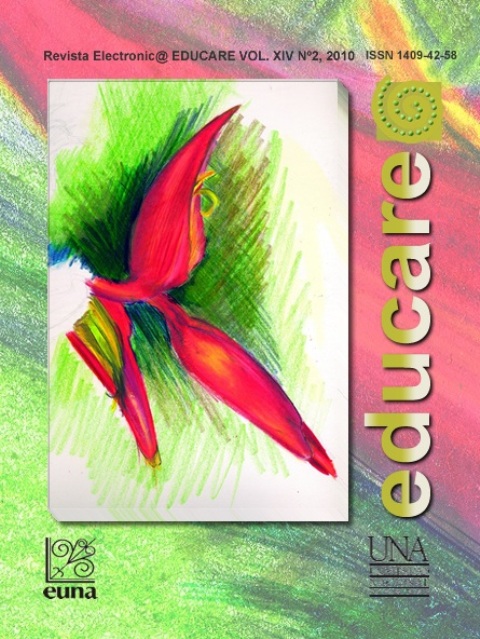The English Language in University Curriculum: Importance, Challenges and Achievements
DOI:
https://doi.org/10.15359/ree.14-2.4Keywords:
globalization, mundialization, technological revolution, curriculum, english, second languageAbstract
The importance of English language inclusion into university’s curriculum is based on the demands of globalization and market interchanges, that is why English language must be considered as part of students’ instruction as future professionals that will contribute to the integral development of the nation.
References
Blanco, N. (2006). Saber para vivir. En A. M. Piussi y A. Mañeru. (Coords.). Educación, nombre
común femenino (pp. 158-183). Barcelona: Octaedro.
Cortés, A. y Cabrera, L. (2003). Programa de Inglés para la Conversación Área Comercial y
Servicios Secretariado X, XI y XII. Costa Rica: MEP (Educación Técnica Profesional).
Freire, P. (2002). Pedagogía de la Autonomía. Argentina: Ediciones Siglo XXI.
González, C. (2001). Reforma educativa y transformación curricular. Cuadernos Pedagógicos 3
del Ministerio de Educación de Guatemala, 1-55.
Ordóñez, J., (2001). La globalización de la tecnología, humanismo y educación. Globalización, identidades
y educación. Cuadernos Pedagógicos 4 del Ministerio de Educación de Guatemala,
-69.
Pérez, A. y Sola, M. (2004). Investigación e Innovación en la formación del Profesorado. España:
Universidad de Málaga.
Plan Global Institucional 2004-2011. (2004). Análisis del Contexto Externo e Interno. Costa Rica:
Universidad Nacional.
Weil, P. (1992). La comunicación global. Comunicación institucional y de gestión. Madrid:
Pirámide.
Downloads
Published
How to Cite
Issue
Section
License
1. In case the submitted paper is accepted for publication, the author(s) FREELY, COSTLESS, EXCLUSIVELY AND FOR AN INDEFINITE TERM transfer copyrights and patrimonial rights to Universidad Nacional (UNA, Costa Rica). For more details check the Originality Statement and Copyright Transfer Agreement
2. REUTILIZATION RIGHTS: UNA authorizes authors to use, for any purpose (among them selfarchiving or autoarchiving) and to publish in the Internet in any electronic site, the paper´'s final version, both approved and published (post print), as long as it is done with a non commercial purpose, does not generate derivates without previous consentment and recognizes both publisher's name and authorship.
3. The submission and possible publication of the paper in the Educare Electronic Journal is ruled by the Journal’s editorial policies, the institutional rules of Universidad Nacional and the laws of the Republic of Costa Rica. Additionally, any possible difference of opinion or future dispute shall be settled in accordance with the mechanisms of Alternative Dispute Resolution and the Costa Rican Jurisdiction.
4. In all cases, it is understood that the opinions issued are those of the authors and do not necessarily reflect the position and opinion of Educare, CIDE or Universidad Nacional, Costa Rica. It is also understood that, in the exercise of academic freedom, the authors have carried out a rogorous scientific-academic process of research, reflection and argumentation thar lays within the thematic scope of interest of the Journal.
5. The papers published by Educare Electronic Journal use a Creative Commons License:














 The articles published by Educare Electronic Journal can be shared with a Creative Commons License:
The articles published by Educare Electronic Journal can be shared with a Creative Commons License: 



